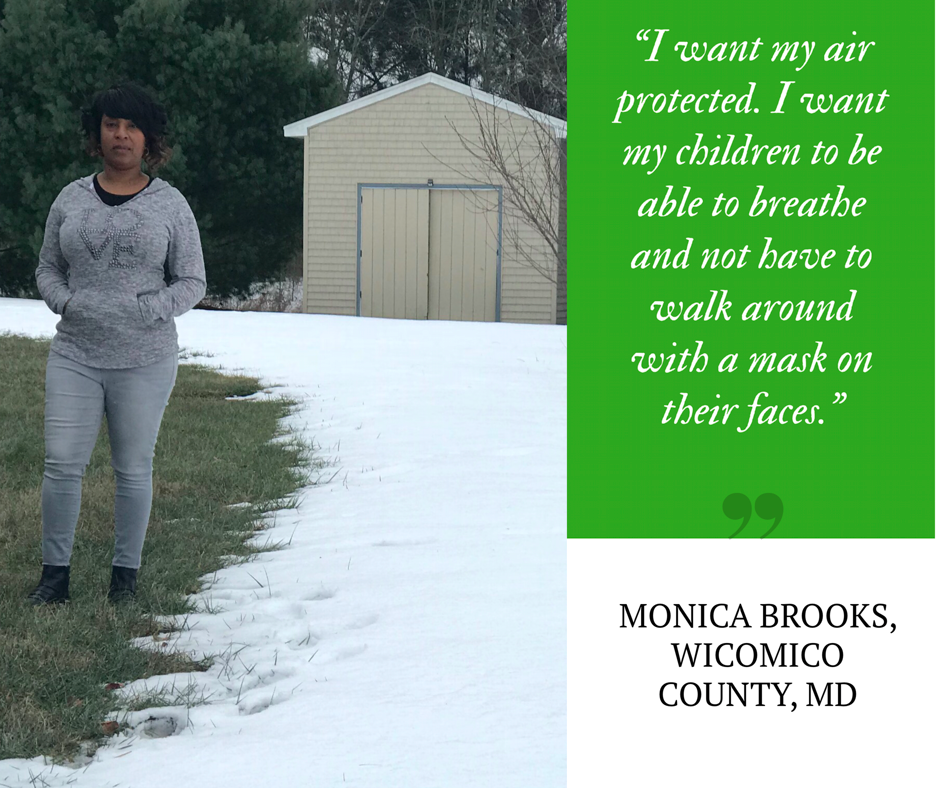Share
Monica Brooks came a long way to live on Maryland’s Eastern Shore. Originally from San Francisco, she never imagined she’d find herself living in a small town on the opposite side of the country.
After working for Motown Records, she decided on a life change and headed east to attend bible college While there, she met and married her husband. Monica quickly embraced the community and its rural lifestyle, and put down roots in Salisbury. Living a much quiet rural life was a real surprise, but she never imagined that shed also become involved in a turbulent two-year fight to protect her community’s air and water from the threat of a poultry concentrated animal feeding operation (CAFO) coming to her new home.

Known as the Crossroads of the Delmarva, Salisbury is an agricultural and commercial hub on the Eastern Shore. Nearly 60 percent of the land in Wicomico County is open and undeveloped. For over ten years, Monica, her husband and their daughter Arabella have lived in a nice quiet neighborhood with plenty of open space. It’s the perfect area to raise a family. That is, until someone applied to build 13 massive poultry barns less than a mile from their home. Monica was shocked and angry when she learned what would be coming and she took action.
Once I found out, I instantly starting making flyers and I started an online petition the same day. But first, I had to get myself educated about exactly what it was because I really didn’t know.
What Monica discovered was that the CAFO would bring more than just poultry. With it would also come life-changing risks to the community’s public health, environmental safety, economic stability and quality of life. With most of the community relying on well water, it was a true community emergency for Monica and her neighbors. She knew local residents had to resist or lose the security of their homes to the coming CAFO pollution.
I want my air protected. I want my children and my grandchildren to be able to breathe and not have to walk around with a mask on their faces, and I want them to have a better quality of life. And I certainly don’t want my property values diminished.
Monica and other local residents founded the community group, Concerned Citizens Against Industrial CAFOs (CCAIC) and started conducting weekly meetings. They also began attending every county council and city council meeting that they could. Not only did they attend every meeting, they spoke up and made sure they were heard.
We sent out the word to neighborhoods, we sent flyers door-to-door, just giving people as much information as we could, and finding that many of them, like us, had never heard of this. There were some who did hear, and either didn’t care, or didn’t think that they had any power to do anything. So we just tried to educate people as much as possible.
The group soon found out that standing up to an industry with such deep, historical roots on the Eastern Shore is an uphill battle. Several of the nation’s industrial poultry giants are headquartered in the area and carry a tremendous amount of economic and political power.
So many people either work in the poultry industry or know someone who works in the poultry industry, because we have Perdue, Tyson, Mountaire, in this region. So many people are tied in that they’re afraid to speak.
Some in the region used the media and public comments to accuse Monica and CCAIC as anti-agriculture and anti-meat activists, arguing that the poultry industry brought much-needed jobs onto the Eastern Shore. Yet CCAIC kept to its simple goal and message.
We’re not anti-agriculture. We’re not anti-poultry. But we see this as an industry that needs to be regulated as all industries are regulated because of what they pollute, their impact on communities, and their responsibilities to the citizens around them.
Despite the criticism and some community strife, Monica and CCAIC never backed down. They appealed to local and state government officials, asking questions and learning what they could do to prevent new CAFOs from coming to Wicomico County. They spread their positive community message by making signs, submitting editorials and letters-to-the-editor to local papers, and appearing on radio programs . They educated themselves on topics central to CAFO regulations, including setbacks, permits and measures they could take to protect their air, water, and way of life.
And in the end their commitment to their families, friends, environment and community worked. Monica and the group have successfully delayed the proposed massive poultry CAFO for two full years. Now in the early part of 2018, a victory may be here. The planned CAFO has still not broken ground — and time is ticking, as the approved permits are only valid until February. While rumors are swirling Monica remains hopeful and ready to continue the fight if needed.
We’re waiting for confirmation and we remain cautious, but we are optimistic that our efforts have finally paid off.

